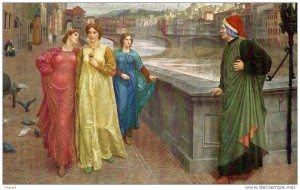Week 24: Tuesday, April 19, 2016
Christianity in Transition: Dante and Beatrice in Purgatory
The idea of Purgatory was a relatively new idea when Dante wrote his own Part Two of his Commedia. The idea had first appeared in Paris in the late 12th Century and had been elaborated and adopted in Rome by a Church Council in 1279. Now Dante wrote his own picture of Purgatory and solidified its image and meaning for all readers of his poem. By 1330, due to the unprecedented success of the Commedia, Purgatory had become an accepted vision of the afterlife and Dante’s three-part epic continued to make it popular with readers and worshipers all over Europe. The great climactic scene of Dante’s journey through Purgatory is his meeting with Beatrice in Cantos 28, 29, 30.
REQUIRED READING:
Make sure you bring your copy of the Divine Comedy, to class so that we can discuss and read passages together. In the Purgatorio, we are particularly interested in Cantos 28, 29, and 30 where DANTE MEETS BEATRICE!: THIS DUAL-LANGUAGE TEXT IS NOT AVAILABLE ON KINDLE BECAUSE THEY CANNOT REPRODUCE THE 2 FACING PAGES WITH ENGLISH AND ITALIAN. WE WANT THE ABILITY TO SEE BOTH ENGLISH AND ITALIAN.
RECOMMENDED READING
This study of the origins of the idea of Purgatory is one of the greatest works of intellectual and social history ever written. jacques Le Goff was Professor of History in Paris at the Sorbonne and he was the master of medieval history. This work is breathtaking in its originality and in its clarity. Le Goff was a master and we mourn his passing just this past year, 2014. This book was originally published in French in 1984 in Paris and is here translated by Arthur Goldhammer for University of Chicago Press.
This study of the origins of the idea of Purgatory is one of the greatest works of intellectual and social history ever written. jacques Le Goff was Professor of History in Paris at the Sorbonne and he was the master of medieval history. This work is breathtaking in its originality and in its clarity. Le Goff was a master and we mourn his passing just this past year, 2014. This book was originally published in French in 1984 in Paris and is here translated by Arthur Goldhammer for University of Chicago Press.

Jacques Le Goff,
The Birth of Purgatory,
University of Chicago Press,
ISBN 0226470830
About the author: Jacques Le Goff (1 January 1924 – 1 April 2014) was a French historian and prolific author specializing in the Middle Ages, particularly the 12th and 13th centuries. Le Goff championed the Annales School movement, which emphasizes long-term trends over the topics of politics, diplomacy, and war that dominated 19th century historical research. From 1972 to 1977, he was the head of the École des hautes études en sciences sociales (EHESS). He was a leading figure of New History, related to cultural history. Le Goff argued that the Middle Ages formed a civilization of its own, distinct from both the Greco-Roman antiquity and the modern world. A prolific medievalist of international renown, Le Goff was sometimes considered the principal heir and continuator of the movement known as Annales School (École des Annales), founded by his intellectual mentor Marc Bloch. Le Goff succeeded Fernand Braudel in 1972 at the head of the École des hautes études en sciences sociales (EHESS) and was succeeded by François Furet in 1977. Along with Pierre Nora, he was one of the leading figures of New History (Nouvelle histoire) in the 1970s. In his 1984 book The Birth of Purgatory, he argued that the conception of purgatory as a physical place, rather than merely as a state, dates to the 12th century, the heyday of medieval otherworld-journey narratives such as the Irish Visio Tnugdali, and of pilgrims' tales about St Patrick's Purgatory, a cavelike entrance to purgatory on a remote island in Ireland. Other books by Le Goff: Time, Work, & Culture in the Middle Ages, translated by Arthur Goldhammer.
(Chicago & London: University of Chicago Press, 1980) Constructing the Past: Essays in Historical Methodology, edited by Jacques Le Goff and Pierre Nora.
(Cambridge: Cambridge University Press, 1985) The Medieval Imagination, translated by Arthur Goldhammer.
(Chicago & London: University of Chicago Press, 1988) Your Money or Your Life: Economy and Religion in the Middle Ages, translated by Patricia Ranum.
(New York : Zone Books, 1988) Medieval Civilization, 400-1500, translated by Julia Barrow.
(Oxford: Blackwell, 1988) The Medieval World, edited by Jacques Le Goff, translated by Lydia G. Cochrane.
(London: Parkgate, 1990) The Birth of Purgatory, translated by Arthur Goldhammer.
(Aldershot: Scolar Press, 1990) History and Memory, translated by Steven Rendall and Elizabeth Claman.
(New York: Columbia University Press, 1992) Intellectuals in the Middle Ages, translated by Teresa Lavender Fagan.
(Oxford: Blackwell, 1993) Saint Louis (Paris: Gallimard, 1996) Saint Francis of Assisi, trans. Christine Rhone
(London: Routledge, 2003) The Birth of Europe, translated by Janet Lloyd.
(Oxford: Blackwell, 2005) In Search of Sacred Time, translated by Lydia G. Cochrane
(Princeton: Princeton University Press, 2014)
HIGHLY RECOMMENDED: There is a good biography of Dante written by the late R. W. B. Lewis, Dante (ISBN 0670899097) and it is excellent and exactly what many of you will want: a short (200 pages), well-written, inexpensive ($19.95) biography of Dante. It is perfect for our course and although I don't want to make it a required book, I am sure that anyone who buys it will be happy they did.


